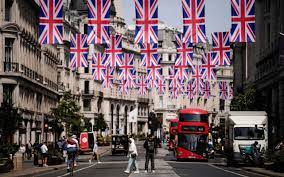According to official data released on Friday, the British economy shrank by 0.1% between April and June as the nation headed towards a recession under a new prime minister.
In order to get the UK closer to a protracted phase of contraction that the Bank of England anticipates will last until the end of 2023, exports declined and consumer spending shrank.
“The economy dropped slightly in the second quarter overall with May’s growth revised down a bit and June showing a considerable fall,” said Darren Morgan, Director of Economic Statistics of the Office for National Statistics (ONS).
According to the ONS, the health sector — where Covid testing and the immunization program were winding down — and retail — where household spending decreased — were the main drivers of the production decline in the second quarter, which came after a 0.8% rise in the first quarter.
It continued by noting that the gross domestic product (GDP) shrank by 0.6% in June, the worst decline since January 2021 but less drastically than the 1.3% decline economists had anticipated.
The Bank of England boosted interest rates this week to combat inflation, which it warned was likely to top 13% in October, and forecast that Britain would enter a recession at the end of 2022 and not emerge until early 2024.
Comparing second-quarter economic output to late 2019, Britain has trailed behind the United States, Italy, and France in recovery from the COVID-19 pandemic. However, Germany has performed worse.
The Institute of Chartered Accountants in England and Wales’ Suren Thiru stated that “the UK economy is edging closer to recession and the worst is yet to come.”
New PM
Following the release of Friday’s figures, Nadhim Zahawi, the finance minister, declared his determination to “work with the Bank of England to get inflation under control and build the economy.”
But despite calls for rapid government action to address Britain’s cost-of-living crisis, Prime Minister Boris Johnson will not undertake “big budgetary interventions” before leaving office next month, his spokesperson said on Monday.
Following a summer-long Conservative leadership contest, Johnson, who last month announced he will resign on September 6 due to a string of scandals, is expected to cede power to either Liz Truss or Rishi Sunak.
Sunak, Zahawi’s predecessor as Chancellor of the Exchequer, and Foreign Secretary Truss have disagreed on how to handle the problem.
Truss intends to slash taxes and reassess the independent BoE’s authority to fight inflation in an emergency budget.
Sunak, however, said that tax cuts backed by increased borrowing would drive the bank to raise interest rates even further. He emphasized the importance of maintaining fiscal restraint and first calming the pricing pressures.

















